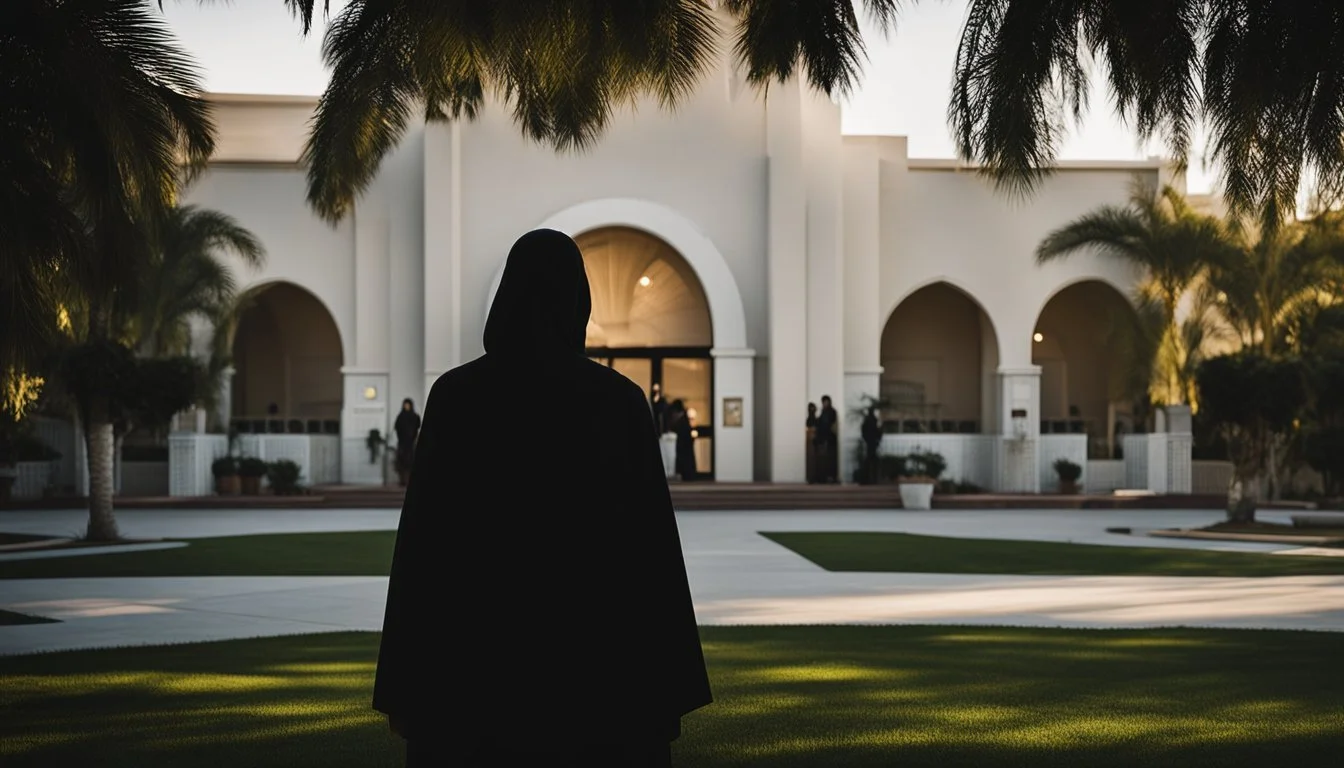6 True Crime Documentaries About Baha'i Faith Communities
Unveiling Hidden Stories
True crime documentaries often capture the darker aspects of society, focusing on communities that might otherwise remain underexplored. These films delve into the challenges and adversities faced by different groups, shedding light on their struggles and triumphs.
This article highlights six true crime documentaries that center around Baha'i Faith communities. By examining these unique stories, the documentaries offer viewers insight into how these communities navigate a world that can be both hostile and supportive.
1) Baha'is: Faith Under Fire (2024)
This documentary examines the persecution faced by Baha'i communities in different parts of the world.
It highlights incidents of discrimination, violence, and injustice encountered by Baha'is. The film uses interviews, archival footage, and personal narratives to paint a clear picture of these challenges.
The documentary aims to raise awareness and provoke thought, showcasing the resilience and steadfastness of Baha'i individuals and communities.
It also emphasizes the ongoing struggle for religious freedom and human rights.
Baha'is: Faith Under Fire (2024) on IMDB
2) A Silent Legacy: True Crime and the Baha'i Community
The relationship between true crime and the Baha'i community is a layered and intricate subject. Baha'i teachings emphasize unity and peace, yet some documentaries explore instances where community values are disrupted.
One notable example is "A Cry from Iran" (2007). This documentary delves into the story of the persecution of the Baha'is in Iran, focusing on the brutal murder of prominent figures. More Information
"To Light a Candle" (2014) by Maziar Bahari examines the systemic persecution of the Baha'i community in Iran, particularly focusing on the denial of higher education for Baha'i youth. More Information
Another significant documentary is "Iranian Taboo" (2011), directed by Reza Allamehzadeh. The film highlights the oppression faced by the Baha'i community and underscores the challenges they encounter in practicing their faith. More Information
Lastly, "The Gardener" (2012), though not strictly a true crime documentary, sheds light on the Baha'i faith through the lens of its gardeners, juxtaposing spiritual teachings against the backdrop of persecution. More Information
These films offer insight into the struggles and resilience of the Baha'i community over the years.
3) The Baha'i Mystery: Unsolved Crimes in Faith
Exploring the intricate and mysterious aspects of the Baha'i Faith sometimes leads to uncovering unsolved crimes within its communities. These cases remain shrouded in mystery, drawing attention to the nuanced and complex nature of faith-based communities.
One notable case includes the mysterious disappearance of Sabah Sabet, a prominent Baha'i who vanished under unclear circumstances. Despite numerous investigations, her fate remains unknown, leaving the community with unanswered questions. Read more on Wikipedia.
Another unresolved mystery involves a series of unexplained fires in Baha'i meeting houses across different regions. These incidents, though initially considered accidents, later revealed patterns suggesting possible arson, sparking further curiosity and concern. Learn more on Wikipedia.
Finally, the case of the involuntary exodus of several Baha'i families from a village due to alleged supernatural disturbances catches attention. These families reported unexplained phenomena and threats, forcing them to leave their homes hastily. The lack of concrete evidence leaves these stories in the realm of speculation and folklore. Find out more on Wikipedia.
4) Hidden Truths: Crimes Against Baha'i Followers
This documentary, released in 2018, delves into the systemic persecution of Baha'i followers in Iran. It features testimonies from individuals who faced arbitrary arrests and property confiscations.
The film highlights not only the personal suffering but also the broader impact on the Baha'i community, underscoring the violation of fundamental human rights. More information on IMDb
5) Baha'i Persecution Chronicles
This documentary delves into the harrowing experiences of the Baha'i community under persecution, primarily focusing on Iran.
Through interviews, archival footage, and personal accounts, viewers gain insight into the systematic violations faced by Baha'is. The narratives reveal the strength and resilience of individuals who endured great hardships for their faith.
The documentary also touches upon key historical moments, such as the arrest and execution of Baha'i leaders. These events highlight the ongoing discrimination and challenges faced by the community.
The film offers a poignant portrayal of courage, emphasizing the importance of religious freedom and human rights. It also serves as a reminder of the impact of intolerance on minority groups.
For more information, visit IMDb.
6) Echoes of Faith: The Baha'i Community and True Crime
"Echoes of Faith: The Baha'i Community and True Crime" (2023) explores a lesser-known aspect of Baha'i communities—their encounters with true crime incidents. Through interviews and investigative journalism, this documentary offers a detailed look into specific cases that have affected Baha'i followers.
The documentary begins with a historical overview of the Baha'i Faith, establishing a foundation for understanding these communities. It then delves into various criminal cases that have impacted them, ranging from fraud to hate crimes.
Highlighted is the case of the disappearance of a Baha'i family in rural Canada. The documentary investigates the circumstances surrounding their disappearance, the community's response, and the subsequent police investigation. Key interviews with family members and law enforcement provide comprehensive insights.
Another significant case involves financial fraud. A member trusted within a local Baha'i community embezzles funds meant for communal projects. The impact on trust within the community and the legal consequences are examined in detail.
The documentary also covers incidents of hate crimes targeting Baha'i places of worship. These events are put into the broader context of religious intolerance, featuring interviews with experts on religious freedom and community resilience.
External Links:
Historical Context of the Baha'i Faith
The Baha'i Faith originated in the mid-19th century and quickly faced significant challenges. Understanding its beginnings and early tribulations provides insight into the resilience of Baha'i communities.
Origins of the Baha'i Faith
The Baha'i Faith traces its roots to two earlier religious movements: Shaykhism and Bábism. Shaykhism, with its theosophical doctrines, emphasized the anticipation of the return of the hidden Twelfth Imam. Many followers of Shaykhism transitioned to Bábism in the 1840s when the Báb declared himself to be this awaited figure.
In 1863, Baha'u'llah, a follower of the Báb, proclaimed himself as the fulfillment of Bábism. He presented a new religious revelation that emphasized the unity of mankind and the importance of global peace. His teachings laid the foundations for what is now known as the Baha'i Faith.
Early Persecutions and Challenges
Once Baha'u'llah declared his mission, his followers faced severe persecution, notably in Persia (modern-day Iran). The nascent community suffered imprisonment, torture, and execution at the hands of the authorities and religious leadership. This persecution was largely due to the faith's new teachings, which were seen as heretical to mainstream Islamic beliefs.
Despite these hardships, the Baha'i community grew. They focused on spreading their message through peaceful means and emphasizing the core principles of unity and equality. Over time, the resilience and determination of the Baha'is enabled the community to establish itself in various regions, continuing their growth even in the face of ongoing challenges.
Interactions With Broader Society
The Baha'i Faith community's interactions with broader society encompass legal and social conflicts, as well as community outreach and public perception.
Legal and Social Conflicts
The Baha'i Faith has faced numerous legal and social challenges throughout its history. Members in certain countries have encountered persecution and legal obstacles due to their religious beliefs.
For instance, in Iran, Baha'is have experienced systemic discrimination in various aspects of life, including education and employment. Laws and regulations in some regions have restricted the practice and dissemination of Baha'i teachings, sometimes leading to imprisonment or other legal repercussions.
Legal disputes have also emerged regarding property ownership and the establishment of Baha'i administrative bodies. These conflicts often highlight the tension between state authorities and the Baha'i emphasis on principles like unity and equality.
Socially, Baha'is have sometimes faced societal bias, affecting their ability to integrate smoothly within their local communities. These issues underscore the broader challenges of religious freedom and human rights globally.
Community Outreach and Public Perception
Community outreach is a crucial aspect of the Baha'i Faith, aimed at promoting social progress and unity. Baha'is engage in various initiatives to support education, healthcare, and community development, often in partnership with local and global organizations.
Public perception of the Baha'i community can be mixed, depending on the societal and cultural context. In regions where Baha'is are more established, their efforts in community-building and social justice are often well-received and respected.
Educational programs, humanitarian efforts, and media outreach play vital roles in shaping public perception positively. Baha'i communities emphasize the integration of scientific and religious knowledge, contributing to policy discussions and social ethics debates.
These outreach activities help in fostering a better understanding of the Baha'i principles and enhance the community's role as a positive social force.








